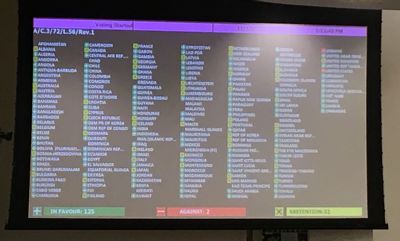An attempt by the United States to revise a U.N. resolution that threatens free speech failed dramatically, as U.N. member states rejected the U.S.'s proposed amendments by a vote of 3 in favor (Israel, Ukraine, and U.S.), 81 against, and 73 abstentions. Instead, the Russian-sponsored resolution, "Combatting glorification of Nazism, neo-Nazism and other practices that contribute to fueling contemporary forms of racism, racial discrimination, xenophobia and related tolerance," was adopted in its original form by the Third Committee of the U.N. General Assembly on November 16, 2017, by a vote of 125 in favor, 2 against (Ukraine and U.S.), and 51 abstentions.
As the U.S. representative noted in her statement supporting the proposed amendments, the resolution "is an annual power play by one nation over its sovereign neighbors. It attempts to exert a sphere of influence over a region and strives to criminalize free speech and expression without any genuine effort to effectively combat actual Nazism, discrimination, or anti-Semitism." The U.S.'s proposed amendments would have eliminated the threats posed by the resolution to freedom of expression. Additionally, the U.S. amendment removed all references to the racist "anti-racism" Durban conferences and Durban Declaration, which accused only Israel of being a racist state.
The resolution now moves out of Committee to the U.N. General Assembly as a whole, where it will be rubber-stamped in December 2017.
November 16, 2017
U.N. resolution threatening free speech advances despite U.S. attempts to amend it
Date
November 16, 2017
Title
U.N. General Assembly Resolution, “Combating glorification of Nazism, neo-Nazism and other practices that contribute to fuelling contemporary forms of racism, racial discrimination, xenophobia and related intolerance,” A/C.3/72/L.56/Rev.1,
U.N. General Assembly Third Committee
Original Source
Note
The resolution was adopted by the U.N. General Assembly Third Committee on November 16, 2017 by a vote of 125 in favor, 2 against (Israel and the U.S.), 51 abstentions (Albania, Andorra, Australia, Austria, Belgium, Bosnia and Herzegovina, Bulgaria, Canada, Croatia, Cyprus, Czech Republic, Denmark, Estonia, Finland, France, Georgia, Germany, Greece, Hungary, Iceland, Ireland, Italy, Japan, Latvia, Lichtenstein, Lithuania, Luxembourg, Malta, Monaco, Montenegro, Netherlands, New Zealand, Norway, Palau, Poland, Portugal, Republic of Korea, Republic of Moldova, Romania, Samoa, San Marino, Slovakia, Slovenia, Solomon Islands, Spain, Sweden, Switzerland, The Former Yugoslav Republic of Macedonia, Tonga, Turkey, United Kingdom)

